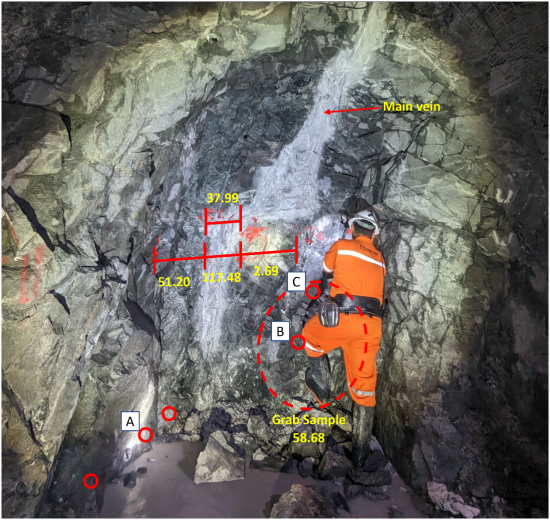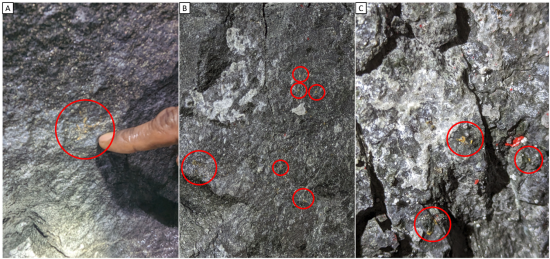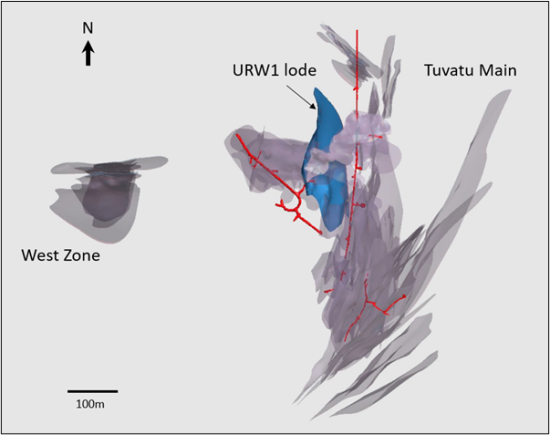High-Grade Assays Received from the First Cut on URW1 Lode
North Vancouver, B.C., May 18, 2023 - Lion One Metals Limited (TSX-V: LIO) (OTCQX: LOMLF) (ASX: LLO) (“Lion One” or the “Company”) is pleased to announce that it has commenced mining on the URW1 lode at its 100% owned Tuvatu Alkaline Gold Project in Fiji.
Strike driving has reached the URW1 Lode and the first underground images of the lode have been received (Figure 1). The initial intersection of the lode revealed one primary vein and numerous stockwork style veins. Visible gold was observed in multiple locations on the face of the lode and within four different fracture orientations (Figure 2). Three of these fracture orientations are sub-parallel to the grade control drill axis and would therefore be difficult to identify given their orientation relative to the grade control drilling (Figure 3). A sample line was completed perpendicular to the main vein, and a grab sample was collected from the foot of the face.
Highlights of the initial face sampling on URW1 are as follows:
- 51.2 g/t Au over 0.56 m
- 117.48 g/t Au over 0.19 m
- 37.99 g/t Au over 0.19 m
- 58.68 g/t Au (grab sample)

Figure 1. URW1 face and select samples. Face of URW1. Red lines indicate the approximate locations and widths of select chip samples collected from the sample line, dashed red circle indicates the approximate location of the grab sample, and small red circles indicate the locations of visible gold on the face. Gold grades in g/t are indicated in yellow.

Figure 2. Visible gold. A), B), C) Close-ups of visible gold highlighted in Figure 1, with gold circled in red. Width of each image is approximately 10-15cm.

Figure 3. Fracture orientations vs orientation of grade control drilling. Grade control drilling (red arrow) is oriented perpendicular to the URW1 lode (blue rectangle). Shapes A, B, C, and D represent the approximate orientations of the gold bearing fractures within the URW1 lode. Orientations B, C, and D are sub-parallel to the axis of the bulk of the grade control drilling and are therefore difficult to identify. The approximate orientations of these fractures are as follows: A) sub-parallel to the main lode, B) striking E-W and dipping steeply to the south, C) striking E-W and subvertical dip, and D) sub-horizontal with variable dip directions.
Lion One Chairman and CEO Walter Berukoff commented: “We are excited to have started mining our second lode at the Tuvatu gold mine, especially so soon after we started mining our first lode. Without the diligence and hard work performed by our geology and engineering teams in Fiji we could not have located the lode as successfully and as accurately as we did.
“We are extremely pleased with the amount of coarse-grained gold visible on the face of the lode, which is even more than was anticipated. Following our initial sampling of the face, and due to the presence of visible gold in multiple fracture orientations, we are optimistic that the overall grade of the URW1 lode could end up being even higher than what the grade control drilling has suggested. We continue to learn more about the Tuvatu system as we open the system up underground, and we are beginning to see how well-endowed the Tuvatu system truly is. Just like the discovery of the URA1 lode on our initial drive underground, the system continues to provide surprises to the upside as our underground developments progress.”

Figure 4. Location of URW1 Lode within Tuvatu. Plan view of the Tuvatu Main and West Zone deposits, with the URW1 Lode highlighted in blue. Underground developments are shown in red, and the other lodes within the Tuvatu Main and West Zones are shown in grey.
About Tuvatu
The Tuvatu Alkaline Gold Project is located on the island of Viti Levu in Fiji. The January 2018 mineral resource for Tuvatu as disclosed in the technical report “Technical Report and Preliminary Economic Assessment for the Tuvatu Gold Project, Republic of Fiji”, dated September 25, 2020, and prepared by Mining Associates Pty Ltd of Brisbane Qld, comprises 1,007,000 tonnes indicated at 8.50 g/t Au (274,600 oz. Au) and 1,325,000 tonnes inferred at 9.0 g/t Au (384,000 oz. Au) at a cut-off grade of 3.0 g/t Au. The technical report is available on the Lion One website at www.liononemetals.com and on the SEDAR website at www.sedar.com.
Qualified Person
In accordance with National Instrument 43-101 – Standards of Disclosure for Mineral Projects (“NI 43- 101”), Sergio Cattalani, P.Geo, Senior Vice President Exploration, is the Qualified Person for the Company and has reviewed and is responsible for the technical and scientific content of this news release.
QAQC Procedures
Lion One adheres to rigorous QAQC procedures above and beyond basic regulatory guidelines in conducting its sampling, drilling, testing, and analyses. The Company utilizes its own fleet of diamond drill rigs, using PQ, HQ and NQ sized drill core rods. Drill core is logged and split by Lion One personnel on site. Samples are delivered to and analyzed at the Company’s geochemical and metallurgical laboratory in Fiji. Duplicates of all samples with grades above 0.5 g/t Au are both re-assayed at Lion One’s lab and delivered to ALS Global Laboratories in Australia (ALS) for check assay determinations. All samples for all high-grade intercepts are sent to ALS for check assays. All samples are pulverized to 85% passing through 75 microns. Gold analysis is carried out using fire assay with an AA finish. Samples that have returned grades greater than 10.00 g/t Au are then re-analyzed by gravimetric method. For samples that return greater than 0.50 g/t Au, repeat fire assay runs are carried out and repeated until a result is obtained that is within 10% of the original fire assay run. Lion One’s laboratory can also assay for a range of 71 other elements through Inductively Coupled Plasma Optical Emission Spectrometry (ICP-OES), but currently focuses on a suite of 9 important pathfinder elements. All duplicate anomalous samples are sent to ALS labs in Townsville QLD and are analyzed by the same methods (Au-AA26, and Au-GRA22 where applicable). ALS also analyses 33 pathfinder elements by HF-HNO3-HClO4 acid digestion, HCl leach and ICP-AES (method ME-ICP61).
About Lion One Metals Limited
Lion One’s flagship asset is 100% owned, fully permitted high grade Tuvatu Alkaline Gold Project, located on the island of Viti Levu in Fiji. Lion One envisions a low-cost high-grade underground gold mining operation at Tuvatu coupled with exciting exploration upside inside its tenements covering the entire Navilawa Caldera, an underexplored yet highly prospective 7km diameter alkaline gold system. Lion One’s CEO Walter Berukoff leads an experienced team of explorers and mine builders and has owned or operated over 20 mines in 7 countries. As the founder and former CEO of Miramar Mines, Northern Orion, and La Mancha Resources, Walter is credited with building over $3 billion of value for shareholders.
On behalf of the Board of
Directors of Lion One Metals Limited
“Walter Berukoff”, Chairman and CEO
Contact Investor Relations
Toll Free (North America) Tel: 1-855-805-1250 Email: info@liononemetals.com
Website: www.liononemetals.com
Neither the TSX Venture Exchange nor its Regulation Service Provider accepts responsibility for the adequacy or accuracy of this release
This press release may contain statements that may be deemed to be "forward-looking statements" within the meaning of applicable Canadian securities legislation. All statements, other than statements of historical fact, included herein are forward-looking information. Generally, forward-looking information may be identified by the use of forward-looking terminology such as "plans", "expects" or "does not expect", "proposed", "is expected", "budget", "scheduled", "estimates", "forecasts", "intends", "anticipates" or "does not anticipate", or "believes", or variations of such words and phrases, or by the use of words or phrases which state that certain actions, events or results may, could, would, or might occur or be achieved. This forward-looking information reflects Lion One Metals Limited’s current beliefs and is based on information currently available to Lion One Metals Limited and on assumptions Lion One Metals Limited believes are reasonable. These assumptions include, but are not limited to, the actual results of exploration projects being equivalent to or better than estimated results in technical reports, assessment reports, and other geological reports or prior exploration results. Forward-looking information is subject to known and unknown risks, uncertainties and other factors that may cause the actual results, level of activity, performance or achievements of Lion One Metals Limited or its subsidiaries to be materially different from those expressed or implied by such forward-looking information. Such risks and other factors may include, but are not limited to: the stage development of Lion One Metals Limited, general business, economic, competitive, political and social uncertainties; the actual results of current research and development or operational activities; competition; uncertainty as to patent applications and intellectual property rights; product liability and lack of insurance; delay or failure to receive board or regulatory approvals; changes in legislation, including environmental legislation, affecting mining, timing and availability of external financing on acceptable terms; not realizing on the potential benefits of technology; conclusions of economic evaluations; and lack of qualified, skilled labour or loss of key individuals. Although Lion One Metals Limited has attempted to identify important factors that could cause actual results to differ materially from those contained in forward-looking information, there may be other factors that cause results not to be as anticipated, estimated or intended. Accordingly, readers should not place undue reliance on forward-looking information. Lion One Metals Limited does not undertake to update any forward-looking information, except in accordance with applicable securities laws.
